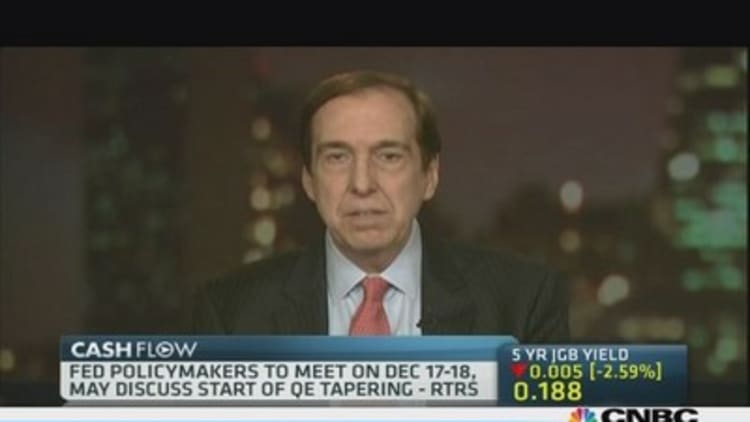U.S. stock index futures signaled a lower open on Wednesday, after the first of several economic indicators which could give an idea as to how Friday's non-farm payrolls number will read and how quickly the Federal Reserve will start cutting stimulus.
Already lower, stock futures declined further after the ADP (Automatic Data Processing) employment report for November, which had 215,000 jobs added during the month. Economists polled by Reuters had forecast that 173,000 private sector jobs were created during the month, a rise on the upwardly revised 184,000 jobs created in October.
"The question for the Fed is the new internal debate of focusing on 'cumulative progress' in the labor market defined as the total amount of jobs created since QE (quantitative easing) started or 'substantial progress' defined as many months in a row of around 200,000 job gains," Peter Boockvar, chief market analyst at the Lindsey Group, wrote in emailed comments.
"The bond market is not waiting around as the 10-year yield is now at 2.83 percent in response to today's number, just 2 basis points from the level it closed at on Sept. 17, the day before the FOMC (Federal Open Market Committee) did nothing," Boockvar added, referring to the Fed's unexpected decision not to begin cutting its $85 million in monthly bond purchases.
Also relevant is Wednesday's non-manufacturing ISM (Institute for Supply Management) index, which tracks economic activity in the services sector. Analysts polled by Reuters forecast that the index will read 55.1 for November, narrowly down on October's 55.4 but still above the 50-mark indicating expansion.

Other data on Wednesday's docket included the U.S. trade gap narrowing to $40.6 billion versus a $40 billion estimate.
Reports still on tap include new home sales for both September and October and the Federal Reserve's Beige Book, its region-by-region assessment of the economy.
Bank stocks will be worth watching on Wednesday, after the European Commission imposed a 1.71 billion euros ($2.3 billion) fine on some of the world's largest banks for interest rate-rigging by traders.
The banks to be fined are Citigroup, Deutsche Bank, Royal Bank of Scotland,JPMorgan, and Societe Generale.
(Read more: Banks braced for $2.3 billion Libor fine)
European and Asian shares were mixed in early trade on Wednesday, with markets cautious ahead of the closely watched payrolls number. Economists polled by Reuters are forecasting 180,000 jobs were created in November, down from October's 204,000 figure.
However, China's Shanghai Composite index rose to its highest level since mid-September on the news that financial liberalization reforms in the Shanghai free-trade zone (FTZ) would be implemented within three months. Zhang Xin, the Shanghai chief of the Chinese central bank, said the policies would serve as a model for other free trade zones in the country.
(Read more: We're reassured by China reforms: World Bank)
Brent crude oil prices pushed lower on Wednesday, with Iran's plans to increase its oil output the focus of discussions at the OPEC (Organization of the Petroleum Exporting Countries) meeting in Vienna, Austria.
At the gathering, Ali al-Naimi, Saudi Arabia's highly-influential oil minister, told CNBC he was unconcerned about Iranian oil oversupplying the market.
"The market will accommodate it," he said.
(Read more: Saudi Arabia responds to Iran's plans to boost oil output)
—By CNBC's Katy Barnato

